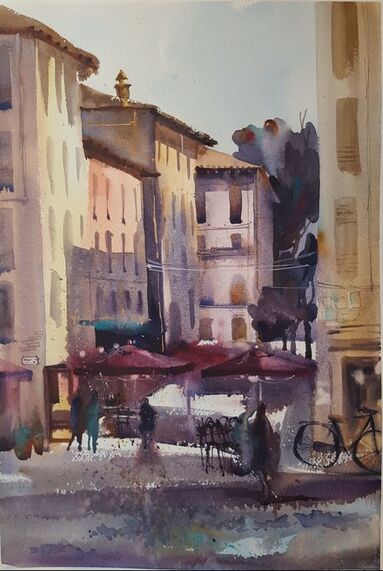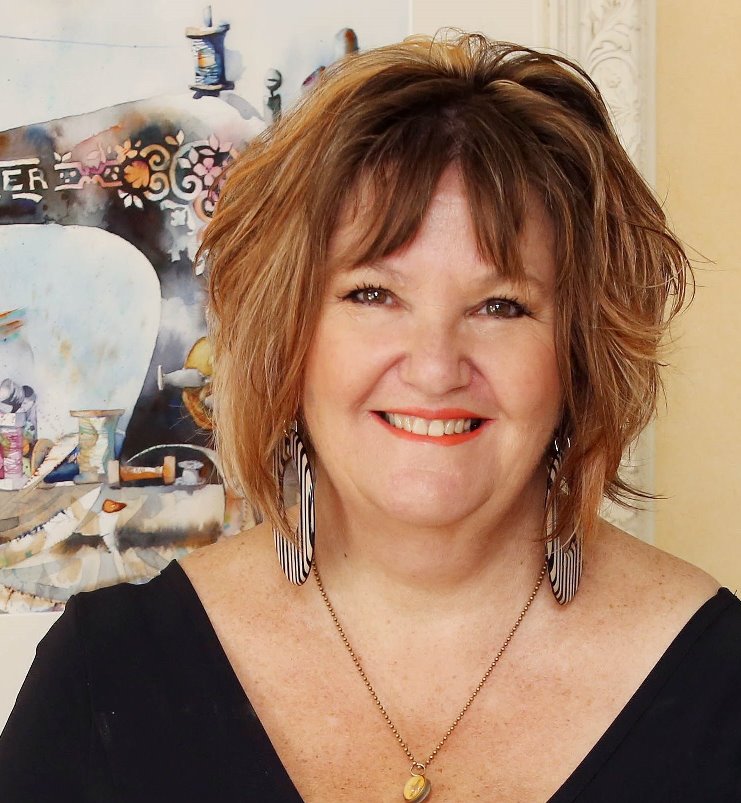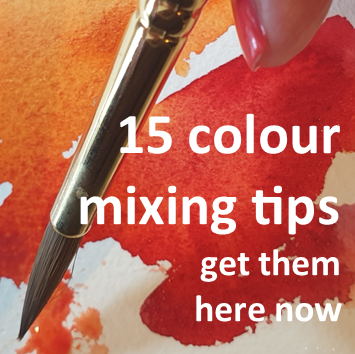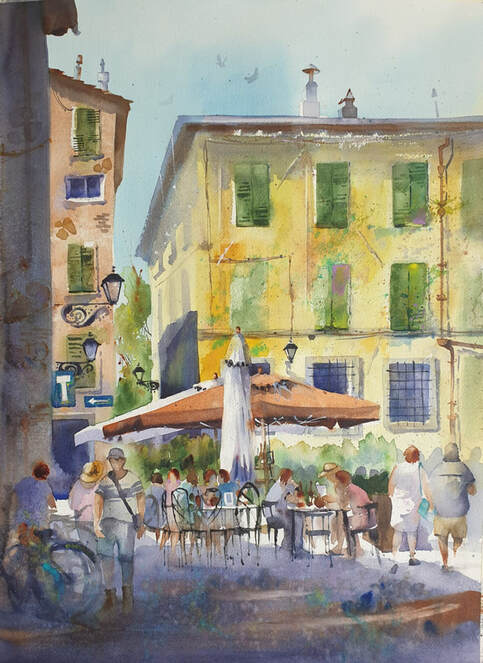 Il menu Piazza San Salvatore Lucca Il menu Piazza San Salvatore Lucca
We've had these discussions before, it's not my intent to disrespect other artists but to caution you, my students and friends and help you avoid some traps, especially those of you who wish to build a genuine art practice.
Recently I visited a cafe with lots of art on the walls, every painting was under $100. I then realised all the work was copied from photographs and other artist's work. I know it's not their photos because the subjects were too wide ranging – landscape, still life, portraits and many different birds from all over the world. There were also other improbable subjects and paintings I feel I've seen before. Depth and detail was missing - a level of understanding the artist had failed to perceive because their reference material was substandard, they lacked study and observation. If they had done their own preliminary sketches and workings and took their own photos they would have captured a greater understanding of their subject, form and atmosphere and detail. Of course, will the buyer/viewer notice? who knows? for $100 does it matter? Yes, it takes all sorts and let’s face it, times are not going to get any easier, we all need to put food on the table. But if your goal is to build an authentic art practice, break out the big guns, command higher prices, sell your work in a commercial gallery, it will show and it will matter. My caution is from an authenticity point of view, to help you build a genuine art practice. We don’t all have access to everything to paint. That’s excellent, you like to paint different subject from me, you’re already passionate about a subject that is meaningful to you. For example if you love birds and painting them, I suggest you get a good camera and go take your own reference photos. Go and sketch from life – sketch 1000’s and 1000’s of birds and get good at what you want to do. If you love painting landscapes go and get amongst it. I guess I get a bit antsy about this because I and many artists I know feel they’re doing the hard yards creating original works and series, only for someone to come along and copy. From the first inkling of an idea, some of my work took 3-4 years of brewing, mulling and working before they became a painting and then a series. The reason I bring this all up is because just last week I was asked "does it matter?". How can another artist prove their work is their work? Are we likely to be held up for breach of copyright? Yes it’s a distinct possibility, especially as times get tougher and the internet is more and more clever. If you are painting from other people's reference and photos, your paintings are not your work. More than this, your sketches show your integrity, your commitment to your artistic development and demonstrate a body of work which is your own. The devil is in the detail. Take your own photos (proof), create studies, preliminary sketches and workings (more proof). With a continued course of study you will capture a greater understanding of your subject - form, atmosphere and detail and develop a more interesting and cohesive body of work that is your own, beyond question. non ferma cari amici!! From TS Eliot TS Eliot once said “Immature poets imitate; mature poets steal; bad poets deface what they take, and good poets make it into something better, or at least something different. The good poet welds his theft into a whole of feeling which is unique, utterly different from that which it was torn”.
3 Comments
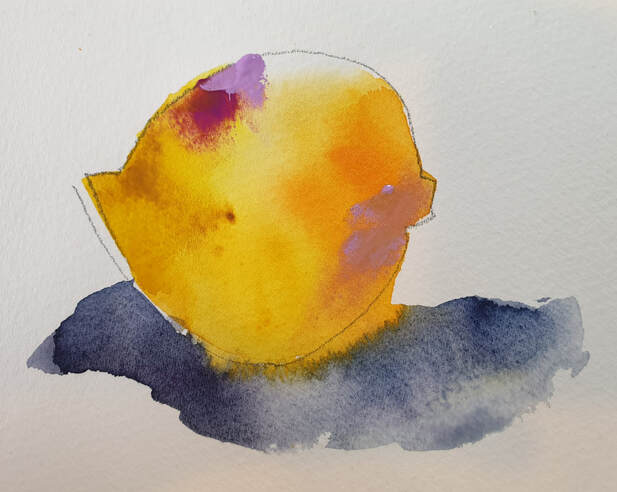
Watercolour is often viewed as if it occupies its own little vacuum.
I remember a well-known artist friend collecting his paintings after a show: “I’m here to collect my paintings” “What do you mean?” “I’m here to collect my paintings” “Oh you mean your watercolours” As if watercolours are not paintings and are separate, not even a category – not art, nor paintings – urk! However, oddly enough, painted with a brush (in most cases!). It’s a common weird nonsensical bit of claptrap. Mamma mia!! Sometimes it feels like watercolour painters are set up for this. A popular art show I used to enter had a “professional” category for Oils/Acrylics. Does this make me not a professional artist? For a while I entered the professional category just to state my case and annoy them, really it’s just ignorance (mine or theirs??). I was particularly miffed to discover that my well-known watercolour artist Uncle started that show in 1954 (or thereabouts)!! Instead of being hailed the Queen (lol), my bags packed and cast into the snow!! My point is, no matter your medium (pastel, music, poetry, blogging, sculpture, watercolour or oils) art is art and all need the same kind of thought and emotive language – darkness brings the light, grey accentuates chromatic colour, dominance emphasises an accent, indications are mysterious. All art forms follow a set of guidelines (rules to be broken). Visual art is no different, we follow design principles created to help novice (and not-so novice) artists use pictorial or visual language to tell a story via visual impact. In particular, today, I’m talking about colour charging. My 2 ideas for you today are:
The watercolour painter has to be patient (I’ll just leave now!) and focussed and wait for the water-to-paint-to-brush-to-paper ratio to be just right. Mostly novice watercolour painters are taught to “let it dry” which is the biggest mistake ever. I say this because this damp time is the fun-zone of watercolour and you are missing out my friend! Boo!! Partly the issue lies in our process and planning and partly our lack of brush miles and then sometimes our courage flies out the window. But this FUN-ZONE is where the magic happens, what you and I have to do is be present and pay attention to what we’re doing and what’s happening on the paper. This level of focus is where you’ll learn the poetry of watercolour – choose your focal point and play with it. How fun would it be to paint a lemon with a dab of orange, a bigger dab of a cooler yellow and a master stoke of cool pink for a shadow? ciao belli pitturi!! 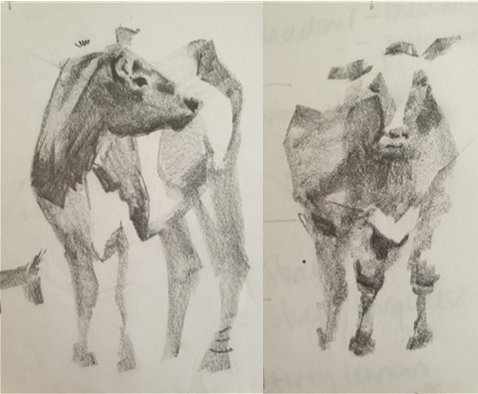 ode to country & western!! ode to country & western!!
edited from my original post 070115
It’s really hard to create a painting about a subject I have no interest in, having said that, I can make myself want to paint a particular subject simply by working through a research process and getting to know and appreciate the subject. Imagine what it would be like for me to be told Country & Western theme ... ?**$#@!!**^?? Guess what? You can get fired up about any subject too!! While I was still working in the corporate world but dabbling in watercolour painting, I was thrilled that my tutor would supply the subject matter. It meant one less thing for me to worry about, all I had to do was turn up every week and she'd have an amazing array of cool stuff she had pulled together for us. Barbara was a tremendous creative facilitator. Another upside to this was that I learned to accept what was in front me, whether I liked it or not, this was no time to be fussing and complaining, I had 3 hours of painting time in front me, better get to it quick! In writing this post I realise too, part of my inspiration for a subject came from our group discussion about the subject and everyone's ideas. Some of my best painting experiences have been painting in a group. The more research I do about a particular subject the more passionate and determined I become to paint it. I fall in love with the subject ... it could be something as simple (?) as a brick wall or the way the light falls on a glass and the shapes and colours it creates. The intricacies of a subject become fascinating, although I don’t paint a lot of detail (this must have been written a while back!), I go through a process of studying the detail and deciding what I will leave out, what to include and which details describe my message best for that piece of art. Typically my research might include a small sketch or two on site as well as a bigger more formed sketch I call a plein air painting. When I’m in my studio, if I’m painting from my imagination, I create lots of doodles and lots of composition thumbnails. I’m reluctant to paint scenes from a photo preferring to paint en plein air, not always possible and although I’m wary, I’m very happy with a lot of them. For me, there is a driving force to create and always has been. Among other creative endeavours, I’ve always drawn and painted. It seems stronger now than ever and I think this may be, in part, because I work as a professional artist creating and painting most days - total immersion is good! My brain is more switched on to looking for subject matter and planning my next work – everywhere I see a painting waiting to be painted. The more I look for subjects the sooner they appear - the more I paint the more ideas I get. Happy painting!! ciao amici!!
|
AuthorPaintBox Tips, secrets, random thoughts, Poetry in watercolour is made in the freedom of the here and now. Amanda Brett Inspiration exists, but it has to find you working - Pablo Picasso There are no mistakes in watercolour, just some extra surprises!! Categories
All
What my readers and viewers have to say
Your emails are so informative! I must confess I've watched a couple of your demos from beginning to end, and it makes me want to watercolor!!! I've only ever painted with oil or acrylics and haven't know how to begin with WC. Your content is excellent!
Susan VN Hi Amanda
Thank you for your tips. They inspired me to practise and I realised I haven’t been loading the brush properly. I learnt about adding more paint, and not water, to washes. In today’s tips I like the idea of painting with purpose. Your tips are very helpful. I very much appreciate receiving them. Elizabeth Hi Amanda I enjoyed your post and generous tips. Looked up Dan Burt I begin to see that you can colour any subject to give it pizazz so long as the tone and form is correct Certainly adding value now to my attempts Thanks heaps Annie
Yes very wise words. Agree with not fussing and agree with comments about good quality paint. Well written and inspirational as always. Cheers Janet xxxx Archives
July 2023
Copyright © 2022 All images and text on Amanda's blog and website are the the legal property of Amanda Brett and may not be reproduced without express permission from Amanda Brett or her authorised agent. Thank you for respecting her art and the livelihood of all artists.
|

